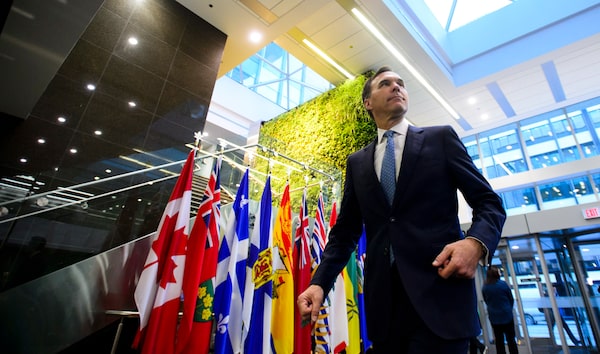
Finance Minister Bill Morneau, seen here on Dec. 10, 2018, has asked an advisory committee to start a second review to decide what the new rules should look like, focusing on control of personal data, privacy and security.Sean Kilpatrick/The Canadian Press
Ottawa wants to create a new strategy to strengthen data security as it inches closer to making rules to govern open banking, a concept that allows consumers to share their banking records and get better financial services in return.
The federal government has been studying the merits of open banking since 2018. In its initial phase, an advisory committee was asked to determine whether Ottawa should encourage the spread of open banking. On Friday, Finance Minister Bill Morneau concluded the answer is yes, and released the committee’s findings.
Mr. Morneau has asked the committee to start a second review to decide what the new rules should look like, focusing on control of personal data, privacy and security. Millions of Canadians already use services from financial technology startups that are based on principles of open banking, but that often require customers to share their passwords and then allow the use of a technique called “screen-scraping” to gather data. A lack of clear regulation of the sector has raised concerns.
“There is no going back,” the committee report states. “A significant amount of data sharing is already undertaken in the market through inefficient technological workarounds that present liability and security risks for all.”
In the next phase, the government has adopted a largely hands-off approach, leaving it up to the advisory committee and a large group of industry stakeholders to decide which rules or laws should be considered. “We are not being prescriptive on the how,” said Pierre-Olivier Herbert, a spokesperson for Mr. Morneau, adding that the minister is asking the committee to propose a framework, which the government will then review “to decide if and how to move forward.”
But advocates of open banking are already criticizing the government for being too tentative in its approach, and for focusing too narrowly on security at the expense of competition and the complex mechanics of open banking.
Andrew Moor, the chief executive officer of Equitable Group Inc., which owns the digital bank EQ Bank, said he is “very disappointed” with the government’s narrow focus.
“While data security is really important in financial services, it is not the only goal, as pointed out by the advisory committee itself,” Mr. Moor said. “This seems like trying to improve health and well-being by only focusing on exercise and not recognizing that diet and mental wellness are also important.”
Open banking promises to make it easier for consumers and small businesses to take better control of their financial data, switch banks or get personalized insights into their financial health. Early examples would include apps that give customers a detailed financial picture of how they are spending their money and where savings could be found.
But open banking is also highly complex, raising issues about how to decide which companies should be allowed access to customers’ sensitive financial data and who is liable in the event of a data breach or other error. Even the term “open banking” is up for debate: Friday’s report says it should called “consumer-directed finance" instead, to reflect a system whereby consumers can instruct their bank about which data can be shared securely with accredited third parties.
Last year, professional services company Accenture PLC conducted a survey on open banking in Canada and found that 89 per cent of respondents had concerns about open banking, and only one in five said they share bank account data with third parties that aren’t banks to get a better deal.
The second phase of consultations will start this spring, and another report with recommendations is due by the end of 2020. But as other countries such as Britain and Australia have moved faster to embrace open banking, some financial services leaders worry Canada will fall farther behind. Andrew Graham, CEO of financial technology company Borrowell Inc., said the report is a good first step, but that the sector needs clear guidelines so that all involved are on the same page.
“I think we have to be clear that Canada is behind other jurisdictions when it comes to creating standards, when it comes to creating a consumer-focused regime or framework. Clearly we need something,” he said.
Addressing these concerns “will not be straightforward,” the committee wrote, given that financial regulation involves provincial and territorial governments. But its report does not specify which policies or laws should be amended to regulate open banking.
“I’m not trying to say this is simple or easy. It’s not," Mr. Graham said. "But it’s absolutely solvable.”
Your time is valuable. Have the Top Business Headlines newsletter conveniently delivered to your inbox in the morning or evening. Sign up today.
 Bill Curry
Bill Curry James Bradshaw
James Bradshaw